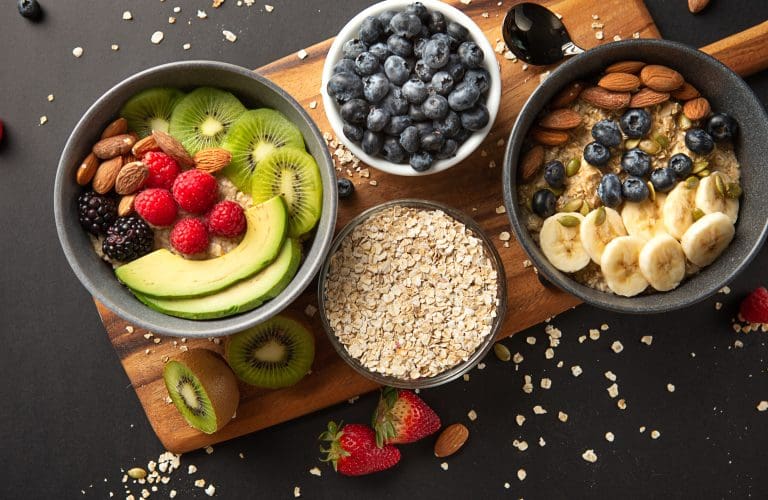The Mediterranean Diet in Senior Living – Benefits and Meal Plans

Diet plays an important role in healthy aging and finding a diet that works for you, and getting started can feel more challenging than sticking to the diet itself.
At Northbridge, our communities plan menus based on the Mediterranean Diet. This diet is a great option for older adults because it aids in decreasing the risk of heart disease, depression and dementia.
Read more about dining at Northbridge in our Ask the Experts LinkedIn article.
You’ve decided to start the Mediterranean Diet, now what?
First, don’t think of it as a diet that limits the foods you are allowed to eat, think of it as a shift in lifestyle. We often think of the word diet as something we do to lose weight. The Mediterranean Diet is all about making better choices to live a healthier lifestyle and promote healthy aging. Be thinking about all the amazing foods you are going to be able to enjoy and experiment with, while eating a Mediterranean Diet.
As with any diet or food plan, your first trip to the grocery store may be overwhelming. Try to keep in mind what foods will be good to have on hand and what foods you should probably avoid while at the store.
Increase foods like: berries, green leafy vegetables, unsalted nuts, extra virgin olive oil, poultry, seafood, and whole grains.
Decrease foods like: red meat, sweets, butter or margarine, and fried foods.
Here is a quick list of foods to consider during your next grocery run:
- Vegetables: artichokes, arugula, beets, bell peppers, broccoli, brussels sprouts, butternut squash, cucumber, eggplant, lettuce, etc.
- Fruits: avocados, apples, bananas, blueberries, cantaloupe, cherries, dates, figs, grapes, olives, etc.
- Grains: barley, brown rice, quinoa, farro, oats, polenta, whole-grain bread, whole grain pasta, etc.
- Nuts/Seeds/Legumes: almonds, Brazil nuts, chia seeds, chickpeas, green beans, flaxseed, hazelnuts, lentils, pistachios, sunflower seeds, walnuts, etc.
- Poultry: white, skinless meat
- Fish: mackerel, salmon, herring, tuna
Now that we’ve provided you with a list of foods, lets dive deeper into why they are so beneficial and part of the Mediterranean Diet.
- Extra virgin olive oil – unlike butters or margarine using extra virgin olive oil has been linked to improved lipid profiles, lower post meal glucose, and a reduction in things like chronic inflammation, blood clot formation, and high blood pressure.
- Fruits and vegetables – eating a good amount of fruits and veggies can lead to increased dietary fiber which aids in weight control and gut health.
- Nuts – these are a great snack that will help with keeping you full as well as reduce risk of heart disease and lower LDL (bad cholesterol) levels.
- Fish (Omega 3 Fatty Acids) – help with lowering triglycerides and reducing inflammation.
Below are a few sample meals to get you started on your Mediterranean Diet journey:
Day 1
Breakfast: Steel-cut oatmeal topped with blueberries
Lunch: Burrito bowl made with brown rice & cauliflower rice, topped with beans, avocado slices, fresh salsa and a dallop of non-fat Greek yogurt or low-fat sour cream
Dinner: Greek yogurt marinated chicken, quinoa tabouli, roasted zucchini & summer squash
Day 2
Breakfast: Veggie Frittata with ½ oz cheese & whole grain toast
Lunch: Summer cucumber & veggie salad with grilled salmon
Dinner: Turkey meatballs with whole grain or protein pasta
Day 3
Breakfast: Unsweetened Greek yogurt with berries, nuts, cocoa nibs and a drizzle of local honey or maple syrup
Lunch: Mediterranean grilled chicken and veggie wrap with hummus and a side of
Dinner: Chicken sausage chili with beans & butternut squash
Day 4
Breakfast: Greek yogurt with berries, whole grain granola, and a drizzle of local honey
Lunch: Quinoa bowl topped with sliced chicken, feta and veggies, drizzle of extra virgin olive oil and balsamic vinegar
Dinner: Roasted chicken breast with olive oil, lemon zest, capers, feta, artichoke hearts, topped with a lemon white wine sauce and served with asparagus and wild rice
Snack ideas:
- Roasted red pepper hummus with cucumbers and pita bread
- Grilled flatbread topped with pesto, fresh mozzarella, spinach, tomatoes, roasted garlic, and balsamic glaze
- ¼ cup walnuts or almonds with dried cranberries
- Fresh fruit
- Veggies with Hummus or Greek yogurt dip
- Smoothie
- Low sugar whole grain granola or protein bar
- Rice cakes or whole grain bread with nut butter
- Whole grain crackers with an ounce of cheese
- Hard boiled egg
Try swapping the sweets for these treats:
- Fresh, roasted or grilled fruit
- Whole grain fruit sweetened baked goods
- Low glycemic natural sweeteners like raw sugar, agave, honey, evaporated cane juice or pure maple syrup over refined sugar.
Our Eat Fresh, Eat Local Signature Program is a perfect compliment to the Mediterranean Diet we promote in Northbridge communities. Sourcing fresh ingredients from local vendors gives residents the chance to enjoy green, leafy vegetables, the best New England seafood, fruits picked from local farms (and sometimes grown at the community), and so much more!
We are fortunate to have some of the best chefs in our communities serving up meals inspired by the Mediterranean Diet. While we encourage a healthy diet, there is always an occasion to indulge in a sweet treat or a traditional meal. Our chefs do a great job of incorporating resident recipes into our regular menus to remind our residents of the tastes of home and all the cherished memories that come with it – just with a little bit healthier of a twist!
If you want to learn more about the menu at a Northbridge community near you, click here to connect with one of our community Sales Directors.
We’re here to answer any of your questions, please contact us if we can provide further information or if you would like to schedule a personalized tour.
Sources:
MyClevlandClinic.org
hsph.harvard.edu
LifeExtension.com